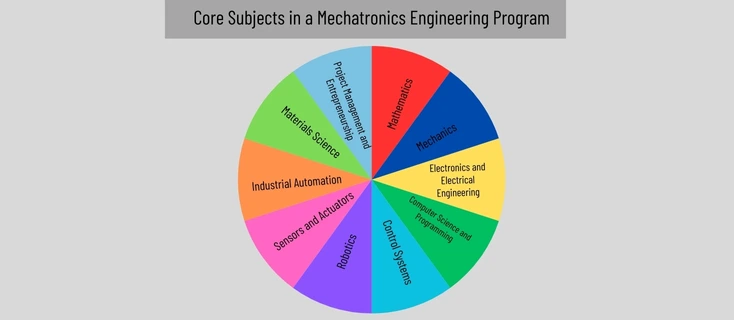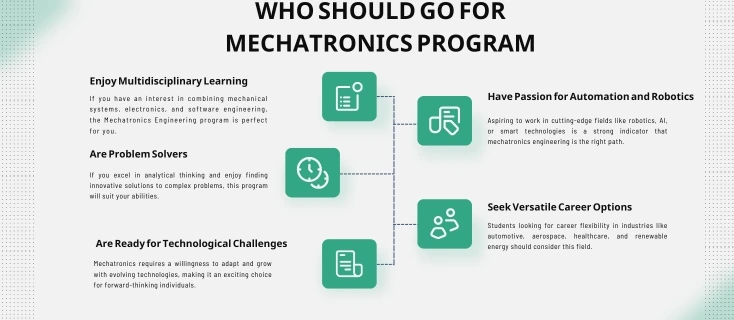Mechatronics, a multidisciplinary field that combines mechanical, electrical, and computer engineering, has gained significant traction in recent years. The demand for skilled mechatronics engineers is on the rise, making Germany an attractive destination for pursuing this field of study. Germany, known for its engineering excellence and world-class education system, stands out as an ideal destination for pursuing mechatronics engineering.
This topic delves deep into the Mechatronics Engineering Program in Germany, its career prospects, top universities, and other important aspects for individuals planning to study Mechatronics Engineering in Germany.
Top Universities Offering Mechatronics Engineering in Germany
Here is the list of some of the best universities offering mechatronics engineering courses:
| University | Program Offered | Tuition Fees | Language of Instruction |
| Technical University of Munich | Master of Science (M.Sc.)Mechatronics, Robotics and Biomechanical Engineering | €258 (semester fee) | English/German |
| SRH University | Bachelor of Engineering Mechatronics | 4,800 EUR/semester | English |
| Karlsruhe Institute of Technology (KIT) | Management of Product Development (MSc, Executive) at HECTOR School | €170 (semester fee) | English |
| Hamburg University of Technology | Master of Science Mechatronics | €300 (semester fee) | English |
| FH Aachen University of Applied Sciences | Masters in Mechatronics | €350 (semester fee) | German |
| University of Erlangen-Nuremberg (FAU) | MSc Autonomy Technologies | €200 (semester fee) | English |
| Technical University of Applied Sciences Würzburg-Schweinfurt (THWS) | B.Eng in Mechatronics | 800 EUR | German |
| University of Applied Sciences Ravensburg-Weingarten | Master of Science (MSc) Mechatronics | €1,500/year | English |
| University of Siegen | MSc in Mechatronics | €250 (semester fee) | English/German |
| Augsburg University of Applied Sciences | MEng in Mechatronics | 1,500 EUR per year | German |
| Heilbronn University of Applied Sciences | Bachelor of Engineering in Mechatronics and Robotics (BEng) | 1,500 EUR per semester | English |
| Deggendorf Institute of Technology | MEng Mechatronic and Cyber-Physical Systems | €500 (semester fee) | English |
Eligibility Criteria for Mechatronics Engineering in Germany
To apply for a Mechatronics Engineering program in Germany, international students must the following requirements:
Bachelor of Mechatronics Engineering in Germany
A bachelor’s degree in mechatronics engineering in Germany offers foundational knowledge and practical skills in this interdisciplinary field. The program typically spans six to seven semesters and includes theoretical coursework, lab sessions, and internships.
Program Structure
Duration: 3-4 years (6-8 semesters)
Focus: Fundamentals of mechatronics, practical training, and internships.
Internships: Most programs include mandatory internships (Praktikum) to enhance practical skills.
Key Features of the Bachelor’s Program:
- Comprehensive Curriculum: Covers subjects like mechanics, electronics, control systems, and computer programming.
- Practical Training: Focuses on hands-on experience through laboratory sessions and industrial internships.
- Language Options: Programs are available in both English and German, with the majority in German.
Admission Requirements:
- Completion of higher secondary education (12th grade or equivalent).
- Proficiency in German for German-taught courses (B2 or C1 level).
- APS Certificate
- English proficiency (TOEFL or IELTS) for English-taught programs.
Master of Mechatronics Engineering in Germany
A master’s degree in mechatronics engineering is ideal for students who wish to specialize and gain advanced expertise. These programs last 2 years (four semesters) and often include opportunities for research and industry collaboration.
Program Structure
Duration: 1.5-2 years (3-4 semesters)
Focus: Advanced concepts in robotics, AI, and industrial automation.
Thesis: A research-based thesis project is usually mandatory.
Key Features of the Master’s Program
- Specialized Modules: Topics include robotics, automation, embedded systems, and AI in mechatronics.
- Research Opportunities: Emphasis on innovation and cutting-edge projects in collaboration with German industries.
- Dual Degree Options: Some universities offer dual-degree programs in partnership with international institutions.
Admission Requirements:
- A bachelor’s degree in a related field with a strong academic record.
- Language proficiency (English or German, depending on the program).
- APS Certificate
- GRE or GATE scores (optional for some universities).
Mechatronics Course Structure and Curriculum
Mechatronics Engineering Courses in Germany are designed to provide both theoretical knowledge and practical skills. Mechatronics engineering courses offered in Germany consist of both theoretical knowledge and practical skills. The pattern includes:
Core Areas of Study
- Robotics and Automation
- Microcontrollers and Embedded Systems
- Sensors and Actuators
- Control Systems
- Artificial Intelligence and Machine Learning
- Industrial Automation.
What subjects do you have to study in Mechatronics Engineering in Germany
The curriculum is designed to equip students with interdisciplinary knowledge and practical skills. Below is a detailed overview of the subjects typically studied in a Mechatronics Engineering program:

Core Subjects in a Mechatronics Engineering Program
- Mathematics
- Linear Algebra
- Differential Equations
- Probability and Statistics
- Calculus
- Mechanics
- Engineering Mechanics
- Dynamics of Machinery
- Strength of Materials
- Fluid Mechanics
- Electronics and Electrical Engineering
- Circuit Analysis
- Digital Electronics
- Microprocessors and Microcontrollers
- Power Electronics
- Computer Science and Programming
- Programming Languages (C++, Python, MATLAB)
- Data Structures and Algorithms
- Embedded Systems
- Computer-Aided Design (CAD)
- Control Systems
- Classical Control Theory
- Modern Control Systems
- Process Control
- Mechatronic Systems Design
- Kinematics and Dynamics of Robots
- Robotic Sensors and Actuators
- Robot Programming
- Artificial Intelligence in Robotics
- Sensors and Actuators
- Types of Sensors (Temperature, Pressure, Proximity)
- Actuator Systems (Hydraulic, Pneumatic, Electric)
- Signal Processing
- Industrial Automation
- PLC (Programmable Logic Controller) Programming
- SCADA Systems
- Industrial Robotics
- Materials Science
- Engineering Materials
- Material Properties and Testing
- Smart Materials
- Project Management and Entrepreneurship
- Project Planning and Scheduling
- Innovation Management
- Business Models in Engineering
Program of Mechatronics Engineering in Germany balances theoretical and practical coursework to ensure that students not only understand the foundational concepts but also gain hands-on experience in designing and implementing mechatronic systems.
1. Core Subjects
- Advanced Mathematics and Physics
- Mechanics and Thermodynamics
- Electrical Engineering and Circuit Design
- Computer Programming and Algorithms
- Systems and Control Engineering
2. Specialized Modules
- Robotics and Automation
- Embedded Systems
- Artificial Intelligence in Mechatronics
- Smart Sensors and Actuators
3. Practical Work
Practical training sessions in state-of-the-art laboratories focusing on the fields of robotics, automation, and electronics.
4. Research Projects
Collaboration with industry partners or independent research in areas like robotics, automation, or renewable energy systems.
5. Internship
Most programs include a mandatory internship with leading German industries, providing real-world experience.
6. Thesis
A comprehensive research project in the final semester to demonstrate expertise in a chosen specialization.
Why Mechatronics Engineering is an Emerging Field

Mechatronics Engineering is rapidly becoming one of the most sought-after fields in technology and innovation due to the following reasons:
1. Integration of Disciplines
The fusion of mechanical engineering, electronics, computer science, and control systems allows for the creation of smarter, automated solutions. According to a 2024 report by MarketsandMarkets, the global mechatronics market is expected to grow at a CAGR of 10.5%, reaching a value of $133 billion by 2028.
2. Industry 4.0
The rise of smart manufacturing, IoT, and AI-driven processes requires advanced mechatronic systems, making it a crucial area of study and innovation. It is estimated that 35% of industrial processes worldwide are expected to be fully automated by 2030, further boosting demand for mechatronics engineers.
3. Global Demand
Industries worldwide are adopting automation and robotics, driving the need for professionals skilled in mechatronics. For instance, the robotics market alone was valued at $27 billion in 2022 and is projected to exceed $74 billion by 2030.
4. Sustainability Focus
Mechatronics plays a vital role in developing energy-efficient systems, renewable energy solutions, and sustainable manufacturing practices. Renewable energy technologies such as wind turbines and solar trackers are increasingly incorporating mechatronic systems, with the global renewable energy sector growing at an annual rate of 8.4%.
5. Wide Application
From healthcare devices like robotic surgical tools to automotive advancements such as autonomous vehicles, mechatronics engineers contribute to diverse sectors. The healthcare robotics market is projected to grow from $6.5 billion in 2021 to $19.3 billion by 2028, illustrating the expanding scope of this field.
Who Should Go for this Program

Mechatronics engineering is ideal for students who:
- Enjoy Multidisciplinary Learning
If you have an interest in combining mechanical systems, electronics, and software engineering, the Mechatronics Engineering program is perfect for you.
- Have Passion for Automation and Robotics
Aspiring to work in cutting-edge fields like robotics, AI, or smart technologies is a strong indicator that mechatronics engineering is the right path.
- Are Problem Solvers
If you excel in analytical thinking and enjoy finding innovative solutions to complex problems, this program will suit your abilities.
- Seek Versatile Career Options
Students looking for career flexibility in industries like automotive, aerospace, healthcare, and renewable energy should consider this field.
- Are Ready for Technological Challenges
Mechatronics requires a willingness to adapt and grow with evolving technologies, making it an exciting choice for forward-thinking individuals.
Cost of Studying Mechatronics Engineering in Germany
Here are the aspects of the cost of studying Mechatronics in Germany:
Tuition Fees
- Public Universities: Tuition-free or a nominal semester fee (€100-€400).
- Private Universities: Tuition fees range from €10,000 to €20,000 annually.
Living Expenses
- Accommodation: €300-€500 per month.
- Food: €150-€250 per month.
- Transport: €50-€100 per month (most students benefit from subsidized semester tickets).
- Miscellaneous: €100-€200 per month.
Scholarships
Scholarships available for Students in Mechatronics Engineering in Germany
- DAAD Scholarships
- Erasmus+ Program
- Deutschlandstipendium
- Scholarships offered by universities and private organizations.
Career Opportunities after Mechatronics Engineering in Germany

Germany’s industrial strength provides ample career opportunities for mechatronics engineers. The graduates can find employment in various sectors, such as:
Industries
- Automotive: Jobs in automation and robotics in companies like BMW, Mercedes-Benz, and Volkswagen.
- Aerospace: Opportunities in Airbus and Lufthansa Technik.
- Manufacturing: Jobs in industrial automation and smart factories.
- Medical Technology: Designing intelligent prosthetics and surgical robots.
- Energy Sector: Developing smart energy systems and automated solutions for renewable energy plants.
- Electronics Industry: Development of highly sophisticated control systems and embedded electronics for a host of devices.
- Defense and Security: Contributions towards developing unmanned systems and intelligent defense equipment.
- Research and Development: Advanced positions related to robotics, AI, and control systems research and development.
Job Profiles
- Robotics Engineer
- Automation Engineer
- Systems Integration Engineer
- Control Systems Engineer
- Research and Development Specialist
- Mechatronics Design Engineer
- Product Development Engineer
- Embedded Systems Engineer
- Maintenance and Operations Specialist
- Quality Assurance Engineer
Average Salaries
Entry-Level: €45,000-€55,000 a year.
Mid-Level: €60,000-€75,000 a year.
Senior-Level: €80,000-€100,000 a year.
Admission Process
Admission Step for Mechatronics Engineering in Germany
- Research Programs: Programs to be opted for, according to interest and the eligibility criteria that are being made available.
- Document Preparation:
- Transcripts of marks
- Statement of Purpose (SOP)
- Letters of Recommendation (LORs)
- Language Proficiency Test
- APS Certificate For Indian Students.
- Online Application Submission: University website or platforms, such as Uni-Assist.
- Visa Application: Secure a student visa (Category D) after receiving the admission offer.
Key Deadline
- Winter Semester: Applications close in July.
- Summer Semester: Applications close in January
Conclusion
Pursuing mechatronics engineering in Germany opens doors to unparalleled technological innovation and professional growth. With its top-ranked universities, affordable education, and thriving job market, Germany is the ideal destination for aspiring mechatronics engineers. Whether you choose a bachelor’s or master’s program, your journey will be both challenging and rewarding, equipping you with the skills to excel in a competitive global industry. Start your academic journey with confidence by partnering with Successcribe, your trusted study abroad consultancy, guiding you every step of the way to achieve your dreams in Germany.
Related Post
Is German Easy to Learn
Healthcare Management in Germany
Fashion Designing in Germany
Executive MBA in Germany















